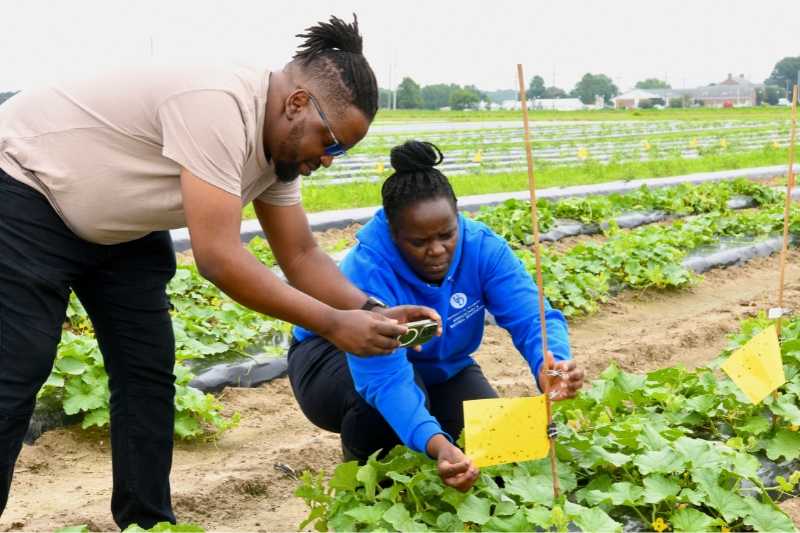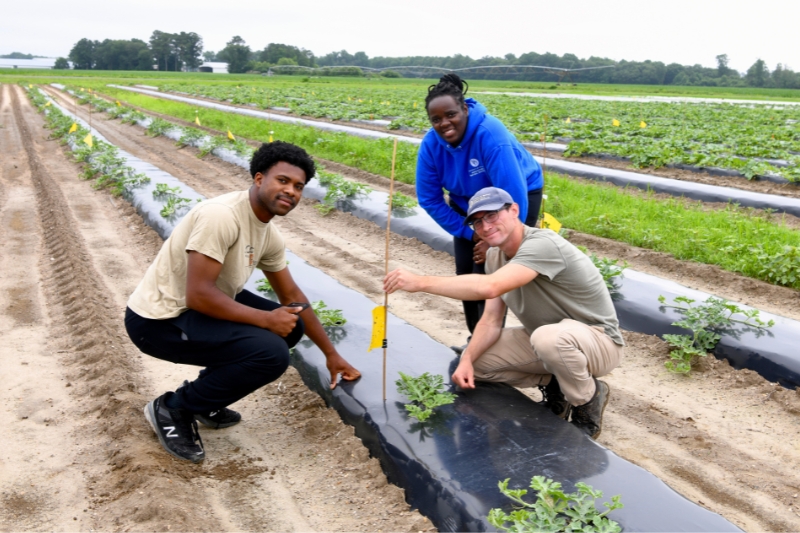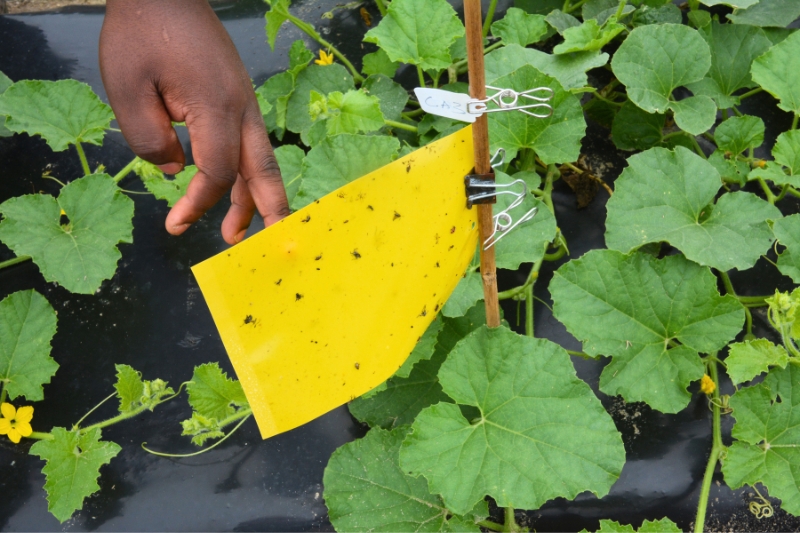


AI for entomology
Photos by Michele Walfred and courtesy of Kudzai Mafuwe July 02, 2025
Entomology Ph.D. student Kudzai Mafuwe uses artificial intelligence to improve pest management in agriculture
The use of artificial intelligence is expanding, taking on agricultural pests to help farmers protect their crops. University of Delaware Ph.D. in Entomology student Kudzai Mafuwe is advancing the use of AI for agriculture, backed by three prestigious awards that have invested in her vision to transform pest management.
Before coming to UD, Mafuwe worked as a curator of entomology at the Natural History Museum in Zimbabwe, where she digitized much of the museum’s largely analog insect collections.
“I realized that we had a lot of valuable information in the museum and thought there should be more that we could do with all the data,” Mafuwe said. “That's when I developed the concept of how we could use such data to develop tools that could be useful for farmers.”
Mafuwe began her doctoral degree at UD in entomology through a Fulbright Scholarship, allowing her to travel to the United States and cover her living expenses. She quickly joined the lab of Michael Crossley, assistant professor and agricultural entomologist in the Department of Entomology and Wildlife Ecology.
Crossley’s lab was already interested in how they could use the ever-changing world of artificial intelligence in the field of entomology, so Mafuwe’s ideas about utilizing AI for pest management made her a perfect candidate to join.
“The world is moving fast, especially in terms of technology and AI,” Mafuwe said. “My project brings aspects of AI to the field of entomology, so we will not be left behind when everyone is moving forward and AI is being applied into everything else.”

Crossley explained that typically farmers hire crop-scouts, folks who observe different areas of the farm and manually monitor for pests using sweep nets, sticky cards, and their observational skills. However, this job is extremely labor-intensive. Mafuwe’s AI tool will help alleviate some of this burden from crop-scouts.
“Take for example, Kennett Square, Pennsylvania, the mushroom capital of the world, where mushroom flies are the key limiting factor in mushroom production,” Crossley said. “Monitoring mushroom flies is challenging because they're so numerous and it takes a lot of time, but we can train computers to identify and count mushroom flies and related insects from images of the traps.”
Crossley said the AI tools would not be replacing the crop-scouts. Instead, they would enhance their work and allow them to do more with their time.
“Rather than spend an hour counting mushroom flies in a mushroom farm, they can take a photo and the AI that we’ve trained gives them back an estimate of the number of flies within 10 seconds, so they just saved 59 minutes of time,” Crossley said. “They’d still have to go to that farm and replace that trap and double-check the AI to make sure it's working, but it’s fast-tracking their work.”
While still in its infancy, Mafuwe hopes she can start implementing her prototype this growing season across a variety of crop systems in addition to mushrooms like watermelon, tomatoes and beans.
“I developed a prototype that we can run off of any local server,” Mafuwe said. “We have been reaching out to farmers trying to show the potential of such a tool and sort of getting their feedback.”

After the development of the prototype, Mafuwe received the American Association of University Women fellowship to continue her work with Crossley.
“Having people willing to invest in the idea that I had and in me as a person is a strong indication of the global importance and relevance of this work,” Mafuwe said. “I began exploring uncharted territories, like AI and computing, because I wanted to work on a project that sits at the intersection of entomology and computer science and become the person who can bridge the gap between those two worlds.
“It's important to have more people who not only have the vision of using AI to solve challenges in entomology and agriculture, but also have the skills to bring those visions to life,” Mafuwe said.
Once she finishes her work at UD, Mafuwe wants to bring her technological knowledge worldwide, with plans to return to Zimbabwe to continue to help farmers with pest management and mentor the next generation of entomologists. As a recent recipient of The Schlumberger Foundation Faculty for the Future Fellowship, a rare third accomplishment for someone in a doctoral program, she hopes to spread her knowledge, particularly to women looking to enter the STEM field.
“In science, to begin with, there is a shortage of women, and then when you talk about entomology, not a lot of women are in the field,” Mafuwe said. “So, there is a huge difficulty in finding mentors as a woman. I didn’t have that many people to look up to in terms of ‘How did you navigate this as a woman while also having a family?’ I would like to be like that for women, not only in my home country, but also across Africa and globally.”
Contact Us
Have a UDaily story idea?
Contact us at ocm@udel.edu
Members of the press
Contact us at mediarelations@udel.edu or visit the Media Relations website

